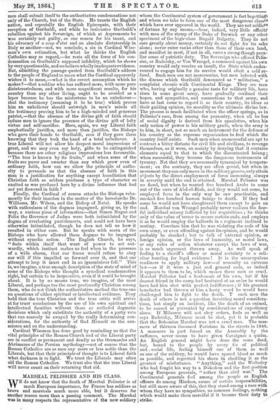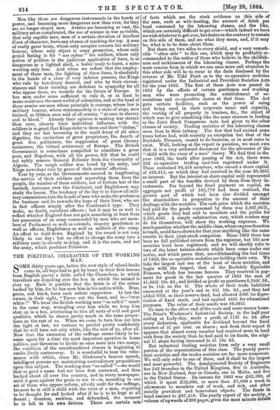MARSHAL PELISSIER AND HIS CLASS.
WE do not know that the death of Marshal Pelissier is of much European importance, for France has soldiers as brave and marshals much more able, but it deserves for another reason more than a passing comment. The Marshal was in many respects the representative of the new soldiery whom the Continental system of government is fast begetting' and whom we take to form one of the most dangerous classes which have ever appeared in the world. They are not soldiers of fortune by any means,—bear, indeed, very little affinity with men of the stamp of the Duke of Berwick or any other speciment of the high-class Dugald Dalgetty. They do not care greatly about money, certainly do not fight for its sake alone; never enter ranks other than those of their own land, and manifest in most, if not in all, cases a strong though pecu- liar sense of patriotic duty. The Sovereign who offered Pella- Bier, or Radetsky, or Von Wrangel, a command against his own country would only receive an insult, the State which endea- voured to engage him for its service would elicit a cold re - fu sal. Such men are not mercenaries, but men infected with the disease which Garibaldi denounced as " militarism," a complaint chronic with Continental Kings. They are men who, having originally a genuine taste for military life, have risen in some great army, have gradually confined their hopes, and sympathies, and connections to that army, and have at last come to regard it as their country, its ideas as their guiding opinion, its morality as the ultimate divine law. The process is much facilitated when the officer springs, as in Pelissier's ease, from among the peasantry, when all he has of social dignity is derived from his epaulettes, when his only notion of power is his military grade, when the army is to him, in short, not so much an instrument for the defence of his country as the supreme organization to feed which the country itself exists. Such men when unsuccessful are apt to contract a bitter distaste for civil life and civilians, to revenge themselves, as it were, on society by denying that it contains elements equal to that to which the discontented belong ; when successful, they become the dangerous instruments of tyranny. Not that they are necessarily tyrannical by tempera- ment; on the contrary, they are often genial, but when in movement they can only move in the military groove, only attain objects by the direct employment of force increasing always in severity until the end is attained. Marshal Pelissier was no fiend, but when he wanted five hundred Arabs to come out of the cave of Abd-el-Riah, and they would not come, he employed force in the only way he saw practicable, and smoked five hundred human beings to death. If they had come he would not have slaughtered them except to gain an end. Marshal von Wrangel probably never realizes the fear- ful individual misery inflicted by his requisitions ; he thinks only of the value of terror to secure certain ends, and employs it as he would employ the halberds in a regiment inclined to mutiny. Convince him that he was violating the code of his own army, or even offending against its opinion, and he would probably be shocked ; but to talk of external opinion, or foreign opinion, or the laws of humanity, or moral laws, or any rules of action whatever except the laws of war, is so much argument thrown away. As well speak of feeling to a sheriff's officer or moral certainty to a soli- citor hunting for legal evidence ! It is the unscrupulous readiness to apply military law—of necessity an extreme law—as if it were a just and general code, as indeed it appears to them to be, which makes these men so cruel. Marshal Pelissier had a bonhoinanie of his own, but if his dearest friend in the camp had hesitated at an order he would have had him shot with perfect indifference ; if his greatest benefactor had thrown at him a hasty word he would have challenged him to fight to the death. T such men the death of others is not a question involving moral considera- tions, but simply an incident, like the death of an animal, to be caused or prevented by considerations of expediency alone. If Milanese will not obey orders, feels as well as says Itadetsky, Milanese must be shot, yet it is probable that the Bohemian Marshal was not a cruel man. The mas- sacre of thirteen thousand Parisians in the streets in 1848. I massacre in part forced on the Assembly by the sufferers, never seems to have given Cavaignac a qualm. An English general might have done the same deed, but, bound to the people by every tie of political and . social life, feeling himself one of them as well as one of the soldiery, he would have spared blood as much as possible, and regretted his share in shedding it as the greatest of misfortunes. "Anything," said the Wellesley who had fought his way to a Dukedom and the first position among European generals, "rather than civil war." The Continental generals feel among the people as ;Enghs.. h officers do among Hindoos, aware of certain responsibilities, but still more aware of this, that they stand among a race with whom they have no sympathies, no common feelings, nothing which would make them merciful if it became their duty tor./ strike.
Kings nowadays rule by grace of their armies' affection. These contained 90,458 members, who owned a share capital the service of their soldiers and separating them from the as interest. But the interest on share capital only represented
people, the number of these soldiers, not of fortune but of the a small part of the benefits derived by them from their in- barrack, increases over the Continent, and Englishmen may vestments. For beyond the fixed payment on capital, an
study the lesson. The tendency of the day is to throw all mili- aggregate net profit of 165,770 had been realized, the tary commissions into the hands of men who make the profession greater part of which had been also divided amongst the business and its rewards the hope of their lives, who are the shareholders in proportion to the amount of their in fact officers simply after the Continental type. They dealings with the societies. The cash price which the societies
make, no doubt, excellent officers ; but it may be as well to had paid for the goods consumed by them was 2,067,867/., reflect whether England does not gain something at least from which goods they had sold to members and the public for her possession of an army commanded by men who are mem- 2,331,650/. A simple su.bstraction sum, which readers may hers of Parliament as well as colonels, country gentlemen as do for themselves, will show the working expenses. We well as officers, Englishmen as well as soldiers of the camp. much question whether the middle dais, whose express function An effort to hold down England by the sword is not very is trade, could have shown for that year anythine° like the same likely in our day ; but an effort to change the army into a results in their joint-stock companies. Since 1862 there has military caste is already making, and it is the caste, and not been no full published return from the registrar, but 105 new
the army, which produces Pelissiers. societies have been registered, and we will shortly refer to

































 Previous page
Previous page